Ya
- yabba ∼ yabber
- to talk too much
Stop yabbering will ya? From the language of the Woiwurrung in central Victoria. since the 1840s

- Stephen Harold Gascoine (1878-1942) was a rabbito who gained fame as Australia's most celebrated cricket barracker.
Nicknamed Yabba, his verbal assaults were legendary at the Sydney Cricket Ground. - yabby
- a freshwater crayfish
Cherax Destructor is native to central and eastern mainland Australia, and have been introduced into WA and Tas. 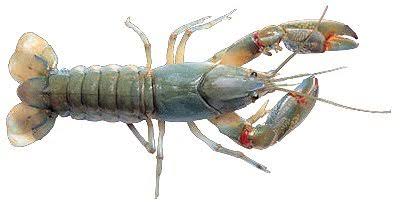 Yabbies are also known throughout the country as crayfish or simply cray, not to be confused with lobsters or rock lobsters which are marine creatures.
Yabbies are also known throughout the country as crayfish or simply cray, not to be confused with lobsters or rock lobsters which are marine creatures.
The confusion arises from the fact that rock lobsters are called crayfish in Tas, SA, and NSW. Known colloquially by various regionalisms australia-wide such as lobsters, which is shortened to lobby in Qld, crawbob in NSW & Qld, crawchie in coastal Qld & north-east NSW, craybob in south Qld & NSW, and craydab in NSW & the ACT. The terms blackie , bluey , and greenie refer to different stages of development. In WA – where Cherax Destructor is a recent import – there are other native freshwater crayfish. The gilgie, pronounced with an initial soft g and also spelt jilgie, (colloquialised as joogie), the koonac, and the marron. To the neophyte they are often confused with the yabby and thus their names are used interchangeably.from the language wembawemba of central vic

- yabbying
- fishing for yabbies
Generally done with a piece of meat attached to a line – you wait until the yabby has its nipper on the meat and then you fling it out onto the land. - yacca
- the xanthorrhoea or grass tree
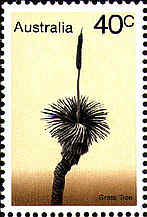 A reference to its yellow resin, Xanthorrhoea literally means ‘yellow flow’ in Ancient Greek.
A reference to its yellow resin, Xanthorrhoea literally means ‘yellow flow’ in Ancient Greek.
Common names include grasstree, grass gum-tree (for its resin-yielding species), kangaroo tail and blackboy, based on the purported similarity in appearance of the trunked species to a man holding an upright spear.
In the South West, the Noongar name balga is used.from the language kaurna from s.a.

- yack
- talk about nothing very important
- yahoo
- a hoon or a reckless person
- yakka
- hard work , especially manual labour
That was hard yakka, mate.from the language yagara from s.e. qld
Common usage is the collocation hard yakka , or in the phrase all yack and no yakka , describing someone who talks about what they're going to do instead of doing it.
since the 1880s

- yank my chain
- to mislead
Are you fair dinkum, or are you just yankin' my chain? - yarndi
- marijuana
- All he does all day is sit around and smoke yarndiSee choof for a related term.
from the language wiradjuri from nsw

- yardie
- 1 a yardman, a general hand in a hotel
- 2 a general dogsbody in a car yard
aussie diminutive


- yarn
- 1 a talk or chat
We had a yarn about old times. This meaning of yarn as a noun is peculiar to Oz and NZ.
2 a story or tale
Especially a long one about extraordinary events.
Hence, to tell stories or tales.
Ye
- yeah - nah
- a non-committal expression
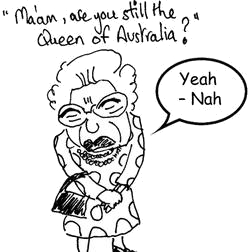 Linguistics experts say it is a form of ‘verbal cuddling’ – agreeing to disagree with you, but in a nice way.
Linguistics experts say it is a form of ‘verbal cuddling’ – agreeing to disagree with you, but in a nice way.
According to The Age, it's a sort of
maybe, but probably not.
Hey, you wanna go fishing later?
Yeah-nah, my wife wants me home.aussie saying

- yidaki
- a wind instrument
The instrument was originally used only in Arnhem Land, but became commonly known in Australia as the didgeridoo.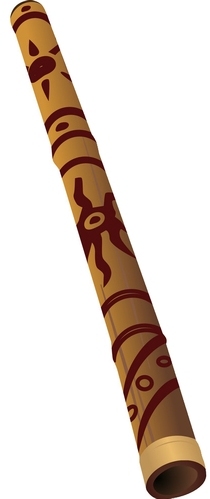 The Yolgnu word for the instrument has become widely known in recent decades, and was popularised by the music group Yothu Yindi, formed in 1986, whose members were Yolgnu speakers.
The Yolgnu word for the instrument has become widely known in recent decades, and was popularised by the music group Yothu Yindi, formed in 1986, whose members were Yolgnu speakers. from the language yolgnu from arnhem land, nt
from the language yolgnu from arnhem land, nt - yiel-yiel
- a small tree of eastern australian rainforests
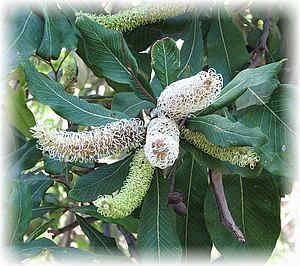 Grevillea Hilliana, also known as the White Silky Oak, produces long branched clusters of white to pale green flowers from May to October.
Grevillea Hilliana, also known as the White Silky Oak, produces long branched clusters of white to pale green flowers from May to October.
The wood is used in cabinetwork. - yike
- a brawl or argument
Yo
- yobbo
- 1 a hooligan or lout
- 2 an unrefined or uncultured person
- yoe
- a ewe
No longer used except in the lyrics to the song Click Go The Shears.
What this means is that the fastest shearer – the ringer – was beaten by the slowest shearer – the snagger, whose ewe – yoe or joe – has already lost its belly wool, and so is quicker to shear.The ringer looks around and he's beaten by a blow
And he curses the old snagger with the bare-bellied yoe.colonial slang
- yonnie
- a small stone suitable for throwing
There are a number of similar words from all over the country for this same item, all of which come from Aboriginal languages. In Vic they have the brinnie , Qld has the gonnie , SA has the ronnie , all along the east coast there is the connie , whilst in WA they have the coondie and the boondie , which also means a large rock, or a sand bomb used by kids. Australia-wide there is the goolie , and the gibber, the only one for which a definite origin is known.first nations
 n language
n language - you beaut!
- excellent, wonderful
aussie diminutive


- youse
- 1 the plural of ‘you’
Borrowed from Irish Gaelic, which has a separate plural for the second‑person pronoun.
Youse guys ought to take a look at this.since the 1890s
2 the singular form of ‘you’
I ain't afraid of youse.since the 1910s

- yowie
- a mythical beast, an unidentified australian hominid
One of several names for an Australian folklore entity reputed to live in the Outback. From the aboriginal language Yuwaalarraay, up Lightning Ridge NSW way.
One story about the name, a variant of yahoo, suggests that the creature is a part of the Dreamtime.
Old Bungaree, a Gunedah Elder, said at one time:
Akin to the sasquatch or yeti, and not to be confused with the bunyip.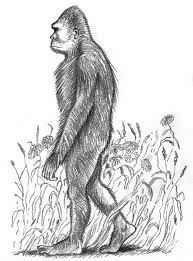 There were tribes of them, and they were the original inhabitants of the country, they were the old race of blacks ...
There were tribes of them, and they were the original inhabitants of the country, they were the old race of blacks ...
The yahoos and the blacks used to fight and the blacks always beat them, but the yahoo always made away from the blacks being a faster runner mostly. -
first nations language yuwaalarraay

- yucko
- disgusting, unpleasant, repulsive
schoolkids diminutive
- yummo
- 1 having a very nice taste
- 2 beautiful , gorgeous
schoolkids diminutive
 it's the
it's the The Illustrated Dictionary of
Australian English
Words and Phrases in Afferbeck Lauder